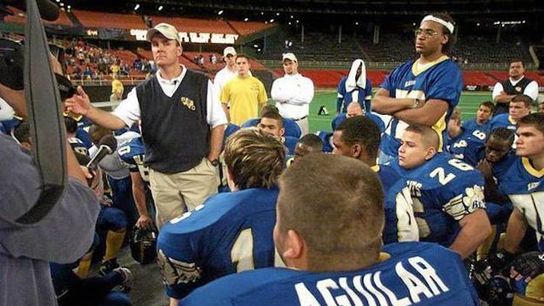Getting married, having a child and getting that first head job are obituary days for coach in any sport -- days that will be marked and remembered long after the coach is gone. All three are major commitments, and all three are tasks that, in a cruel twist of fate, you can't truly know if you're equipped to handle until you're already in them.
Unlike Husband and Father, it's easy to get hired as Head Coach, so it's important that the marriage between a coach, his AD and the university they share works, and it works quickly.
Athletic Director U sat down with SMU AD Rick Hart, who hired Chad Morris as a first-time (FBS) head coach, and VCU AD Ed McLaughlin to explain what they look for in head coaches, particularly in first-timers. And the answer is the same word you hear out of the mouth of every AD over and over and over again: Culture.
"Can they lead? What kind of person are they? Are they going to be able to be that same person under pressure? Are they going to be able to make those decisions and remain aligned with the values and the culture that you've created when it matters and when it impacts them and their families," Hart said.
"We want someone who's come from a championship culture," McLaughlin said. "We want someone who's won championships as an assistant, who's seen really good coaches and learned from really good coaches. I don't think it's reasonable to have NCAA Tournament expectations for someone who's never coached in the NCAA Tournament."
When evaluating if the prospective head coach will be a fit with the department and the university, an AD looks at an applicant just like a coordinator looks at a GA candidate. At the end of the day, do I like this person as a person? Are they someone I can trust to carry out my department's values? Do I want to be in a foxhole with them when the bullets start flying?
"You've got to get in the room with them. Is this someone that we can be open and candid and trusting, because there is a lot of pressure. We know that," Hart said. "We know that if we're asking them to do 12 things and we're asking them to do them at a certain standard, that one of those things disproportionally impacts their livelihood, and that's winning. We've got to have that relationship."
"You can get into things like, 'What's your practice week going to look like?' But the reality is: Can you see that person being your head coach?" McLaughlin said.
And in a bit of counterintelligence, McLaughlin said that while it's important that prospective head coaches are transparent in their strengths and weaknesses, the aspiring head coach should demand the same from the AD interviewing them.
"I've heard coaches say, 'This place is a lot worse than they told me it was. There's so many more problems than they told me.' We've all heard coaches say that, and that's fine," he said. "But if you have trust built up ahead of time, they're not going to say that. I'm a big believer in transparency. Tell them all the good, bad and the ugly."
Watch the full interview here.
